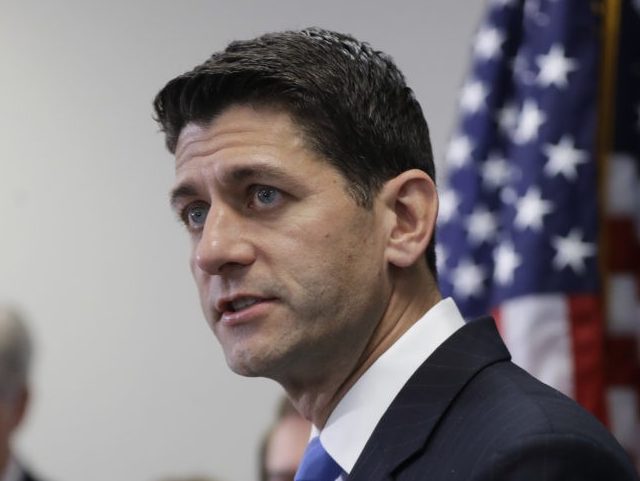The Atlantic’s Ronald Brownstein spotlighted the many ways in which House Speaker Paul Ryan is refusing to adapt his personal policy agenda in order reflect the desires of his party’s standard bearer, who was selected by a record number of Republican primary voters.
Just days before the Ryan is set to campaign with Trump in Wisconsin, Ryan sat down with Brownstein and repeatedly expressed his opposition to Trump’s policy proposals.
In a piece titled, “Is the GOP Donald Trump’s Party—or Paul Ryan’s?” Brownstein notes that Ryan stated his opposition to Trump’s positions on entitlements, infrastructure, trade, foreign alliances, immigration and crime. Brownstein observes that while Trump’s positions on these issues reflect the priorities of “the party’s growing blue-collar wing,” Ryan’s positions represent the donor-class interests of the “party’s business leadership”. Brownstein writes:
“Ryan opposed most key components in the bristling insular populism that Trump used to build a winning primary coalition centered on working-class whites. Trump’s enthusiasm for entitlement and infrastructure spending, his hostility to international trade and foreign alliances, and his provocative positions on immigration and crime, all reflect priorities of the party’s growing blue-collar wing. Yet to Ryan, many other Republican legislators, and much of the party’s business leadership, those positions are economically irresponsible, racially indefensible, and politically suicidal.”
Below is the list of issues Brownstein highlights as areas where Ryan is still fighting Trump on policy.
IMMIGRATION
Brownstein also noted that, with regards to illegal immigration, Ryan once again, “rejected Trump’s plan to accelerate deportation of the estimated 11 million undocumented immigrants: ‘I think there is a way to deal with the undocumented population that doesn’t involve mass deportation,’ [Ryan said during their interview.]”
Instead, Ryan expressed support for allowing people in the country to stay and acquire legal status that would allow them to take American jobs through the issuance of work permits.
During the interview, Ryan described securing the border as a “confidence building exercise” for the American people that would eventually lead them to change their “attitudes” and “embrace” Congressional efforts to “fix our broken immigration system”—i.e. legalize the illegal population.
With regards to green card issuances, Brownstein writes: “Ryan wasn’t familiar with Trump’s call to limit legal immigration to restrict the total share of the U.S. population born abroad, the speaker’s initial reaction was skepticism: ‘I’ve never looked at it like that.’”
Ryan later made the case to Brownstein that rather than curbing immigration, the U.S. should bring in foreign workers to fill the jobs and skill-sets that American workers are not or “cannot” do.
ENTITLEMENTS
Brownstein observed that, “when I asked if Ryan would drop his plan to convert Medicare into a premium support system or to reform Social Security because Trump has repeatedly said he opposes any changes in the programs, the speaker made clear he would not.”
INFRASTRUCTURE
Brownstein noted that Ryan was “equally dismissive” of Trump’s proposals on infrastructure: “’That’s not in the Better Way agenda,’ [Ryan] said, laughing.”
CRIME
“While Trump has stressed ‘law and order,’ Ryan reaffirmed his support for criminal-justice reform,” Bernstein wrote. Conservative critics of Ryan’s so-called “criminal justice reform” have described it as the Obama-Ryan “jail break” agenda.
TRADE
Brownstein asked Ryan about Trump’s plan to renegotiate better trade deals for American workers—in particular, Trump’s declaration that, “I’m going to tell our NAFTA partners that I intend to immediately renegotiate the terms of that agreement to get a better deal for our workers… If they do not agree to a renegotiation, then I will submit notice under Article 2205 of the NAFTA agreement that America intends to withdraw from the deal.”
When Brownstein brought up Trump’s negotiation strategy to pressure foreign trading partners to rework the terms of NAFTA to get a better deal for Americans, and asked Ryan if him if he would “help [Trump] try to achieve withdrawing from NAFTA,” Ryan laughed out loud.
“I don’t want to get into hypotheticals,” Ryan said, still laughing.
Ryan then touted his key involvement in crafting last year’s Trade Promotion Authority (TPA) legislation that was widely opposed by grassroots of both political parties. The measure ceded Congressional authority to President Obama by granting him the power to fast track trade agreements such as the Trans Pacific Partnership (TPP). At the time—in fact, even before he announced his candidacy— Trump described TPA as a “disaster” and another sign the “country is going to hell”.
“As you know, I wrote the trade promotion authority law so that we could go out and get trade agreements,” Ryan told Brownstein. “It’s really important that open up export markets for ourselves. Ninety-five of the world’s consumers live in the other countries, not this country, so we have to have trade.”
Ryan’s continued efforts to push the Republican donor-class’ agenda of global trade comes despite the fact that a recent POLITICO Pro-Harvard poll found that nearly 9 out of 10 Republican voters– whom Ryan is supposed to represent– believe that these so-called “free trade” deals have cost the U.S. more jobs than they have created.

COMMENTS
Please let us know if you're having issues with commenting.